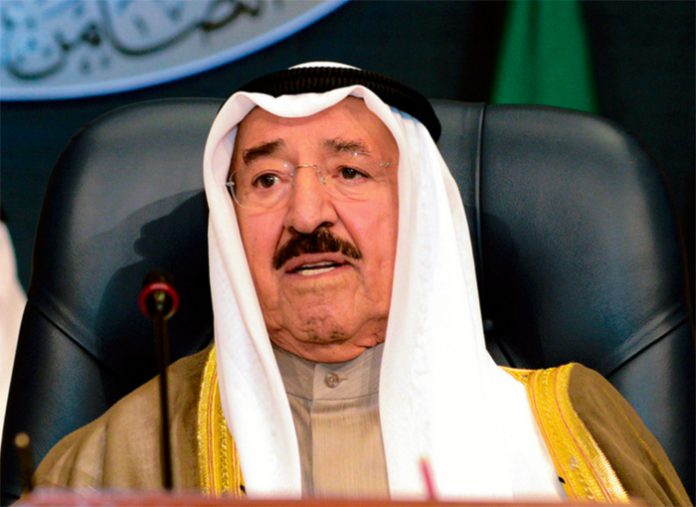Known as the Humanitarian Leader of the World and a peacemaker
Kuwait’s 91-year-old Amir Sheikh Sabah Al-Ahmad Al-Jaber Al-Sabah died on Tuesday 29 Sept in a hospital in the United States.
“With great sadness and sorrow, we mourn … the death of Sheikh Sabah Al-Ahmad Al-Jaber Al-Sabah, Amir of the State of Kuwait,” said Sheikh Ali Jarrah Al-Sabah, the minister in charge of royal affairs, in a television broadcast.
Born in 1929, Sheikh Sabah is widely regarded as the architect of modern Kuwait’s foreign policy – having served as foreign minister for nearly 40 years between 1963 and 2003 – when he became prime minister.
A longtime widower, Sheikh Sabah lived for years in a palace known as Dar Salwa, which was named after his daughter Salwa, who died of cancer in 2002. He is survived by two sons.
He became Kuwait’s Amir in January 2006 after the death of Sheikh Jaber Al-Ahmad Al-Sabah.
In July 2020, he flew to the United States seeking medical attention after undergoing surgery. A US Air Force C-17 flying hospital transported Sheikh Sabah from Kuwait to Rochester, Minnesota, home of the flagship campus of the Mayo Clinic. The high regard for Sheikh Sabah could be seen in the outpouring of support for him across the Middle East as he suddenly fell ill.
‘Valued discretion and moderation’
Sheikh Sabah drew on his decades as the oil-rich nation’s top diplomat to push for closer ties to Iraq after the 1990 Gulf War and solutions to other regional crises.
He represents the older generation of Gulf leaders who valued discretion and moderation and the importance of personal ties amongst fellow monarchs.
The Amir had his appendix removed in 2002, two years after having a pacemaker fitted. In 2007, he underwent urinary tract surgery in the United States.
When the Amir was absent in the past, 83-year-old Crown Prince Sheikh Nawaf Al-Ahmad Al-Sabah, the Amir’s half-brother, was appointed acting ruler as per the country’s constitutional law. Sheikh Nawaf is an elder statesman who has held high office for decades, including the defence and interior portfolios.
Sheikh Sabah’s death comes as the nation continues to fight the coronavirus pandemic, which has infected more than 103,981 people and caused 605 related deaths in the country of 4.1 million. Its health ministry said more than 95,500 people have recovered from COVID-19.
‘One learns from the past’
Sheikh Sabah’s life spanned two very different Kuwait’s. He was born June 16, 1929, just as the country’s pearl-diving industry would collapse. Within the decade, Kuwait would strike oil. Engineers would eventually confirm that the tiny country had the world’s sixth-largest known oil reserves.
He became Kuwait’s foreign minister in 1963 after holding a number of other governmental posts. He would remain in that position for four decades, making him one of the world’s longest-serving foreign ministers.
His country’s greatest crisis came in 1990, when Iraqi dictator Saddam Hussein invaded Kuwait and occupied the nation for seven months.
“One learns from the past and learns about it for the future,” Sheikh Sabah reportedly said. “One has to consider arrangements that would make not only my country stable but make the whole area stable.”
With inputs from agencies

















